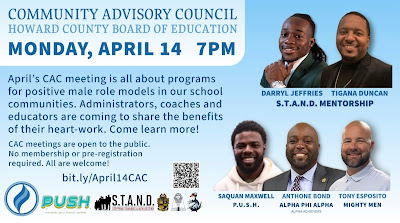A friend recommended this to me and I wanted to highlight this event to all of you. It’s at seven pm tonight and it’s online. No need to leave your house.
Why does it matter? Let me share what Lizz Hammon (recipient of this year’s HCPSS Friend of Education Award) had to say:
At a time when so many seem to be focused on metal detectors, security assistants, mall bans, and curfews — it’s important to me to highlight the awesome programs that are available to our young male students. In the case of STAND Mentorship specifically, their mentors are all volunteers, their mentees are some of the most at-risk students in our schools and they work with their entire families, after school, evenings and weekends. They de-escalate so much conflict but they’re only able to reach about 75 kids at a time. Imagine if we invested in these programs so that more students could take advantage instead of wasting money on ineffective weapons detection technology.
What if we invested in meaningful interventions that had long term benefits? If that’s important to you or if you are simply curious to learn what that looks like, tonight’s meeting is for you.
I have to admit that reading these words at five in the morning didn’t truly penetrate until Facebook threw the following post into my feed. Serendipitous, really. The name of this account is NeuroWild and it is run by Emily Hammond, an AuADHD Speech Pathologist.
I hate the phrase 'make a good choice', because it's often said to overwhelmed neurodivergent kids.
Like, 'do better with the zero resources you have right now.'
Instead of giving them yet another expectation, we need to reduce the other stuff that's draining their capacity.
Then they can more readily access *all* their skills.
Take a look at the accompanying graphic. Instead of saying ‘make a good choice, try saying…’
When I read this, something in my brain clicked.
…’do better with the zero resources you have right now’
…reduce the other stuff that's draining their capacity
…they can more readily access *all* their skills
This is just as relevant to students who are coming to school impacted by poverty, family instability, and experiencing long-term trauma. It is of no help to repeat admonitions like “make good choices” when they have zero mental/emotional resources to tap into. What can we do to reduce the other stuff that’s draining their capacity? How can we help them build the inner resources they need so they can more readily access all their skills?
I complain daily about all of the unasked-for junk that Facebook throws into my feed but this was the exception. It made the importance of tonight’s online meeting of the Community Advisory Council more vivid and easier for me to comprehend.
We can invest in reactive “solutions” that look like assorted ways to police transgressions or we can invest in building up and nourishing that which has been damaged and depleted inside of the kids who are members of our community. We could do that. I believe it would have more long term, overall impact and would be a better use of our funds as well.
Curious? Tune in tonight. And tell me what you think.



Comments
Post a Comment